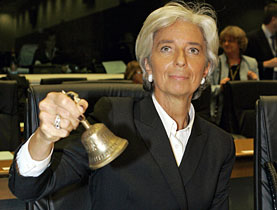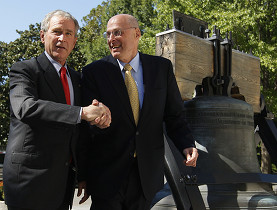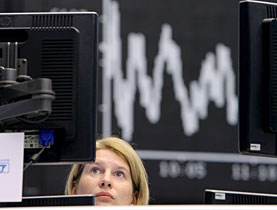Swiss welcome EU move to stabilise markets

Finance ministers from across Europe vowed on Tuesday to make a coordinated effort to stabilise the European banking system, a move Switzerland has welcomed.
Gathering in Luxembourg one day after global markets endured major losses, officials from the European Union agreed to guarantee deposits up to €50,000 ($67,930), which is up from €20,000.
Individual countries, notably Ireland, had previously taken unilateral steps to protect depositors should a bank collapse.
The ministers also agreed in principle to back large banks, but it remained unclear what would happen if one country were unable to save one of its own banks. Coordinating individual rescue efforts, they agreed, would be key.
“We agree that public intervention has to be decided at the national level in a coordinated framework,” the ministers said in a joint statement.
“We all commit to take all necessary measures to enhance the soundness and stability of our banking system and to protect the deposits of individual savers.”
In Switzerland, the federal government hailed the move and reiterated its promise to take steps to keep the country’s financial markets stable. It also said it was preparing potential emergency measures should they be needed but would not elaborate on what those measures might be.
“The Swiss National Bank (SNB) is carefully watching financial markets to see that they have enough liquidity,” the statement said. The government is “conscious of its responsibility in regards to the stability of the financial system”.
Stock markets unstable
The Swiss Market Index, reeling from its worst day since September 11, 2001, weathered a rollercoaster ride to end down 0.48 per cent at 6,427.76 points.
Private bank Julius Baer endured large swings throughout the day. Shares sank below SFr42 only to soar to SFr48 hours later. When markets closed, share prices hung 3.38 per cent in the red at SFr42.90 a share.
Other losers included UBS, which spent most of the day in negative territory to close at SFr19.40 a share, down 7.18 per cent. Swiss Re also stayed under and ended the day at SFr49.80, down 6.39 per cent.
The day’s winners included Syngenta, which closed at SFr199 a share, up 3.65 per cent, and Roche, which ended the day 1.8 per cent up at SFr175.
Liquidity is key
Acting Finance Minister Eveline Widmer-Schlumpf said on Monday that the Federal Banking Commission had taken supervisory measures, and that the SNB was providing sufficient liquidity to money markets.
The government said it believes capital and liquidity are key to the stabilisation of the financial system, as well as dealing with banks’ problematic investments.
The minister, who is standing in for Hans-Rudolf Merz, said the government wanted to protect deposits for banking customers. Swiss savers are currently protected by a banking fund for up to SFr30,000 ($26,250) per person should a private bank collapse.
swissinfo with agencies
The International Monetary Fund now estimates that losses from the global financial crisis total $1.4 trillion (SFr4.56 trillion).
Government officials in Iceland said their country is facing bankruptcy and pegged their currency to the euro. Russia, meanwhile, has agreed to give the North Atlantic country a 4 billion euro loan (SFr6.2 billion).
European stocks posted moderate gains. The FTSEurofirst 300, an index that tracks top European shares, ended the day slightly up at 1.68 per cent. Elsewhere, shares in Royal Bank of Scotland plunged nearly 40 per cent on Tuesday.
“The financial planet is in total crisis,” said Guy Quaden, a governing council member with the European Central Bank.
The turmoil on the financial markets was sparked by the subprime crisis in the US, where borrowers were granted mortgages they were unable to pay back.
This led to a shortfall in liquidity in financial institutions, making it harder for them to carry on their business.
The bank rescue plan hammered out by the US administration and leaders of both Republican and Democrat parties was supposed to stop the collapse of financial institutions by injecting the necessary finance to enable them to continue trading.
The US House of Representatives initially rejected the plan, sparking further alarm on global markets.
The Senate accepted a modified version of the package and the House passed it last week.
Leaders of Europe’s four main economic powers met in Paris on Saturday to prepare for a larger summit to deal with the crisis. Various European governments have already injected money into some of their own major banks and financial institutions to prevent them collapsing.
Manuel Ammann, a St Gallen University professor of finance, says the “fairly weak” Swiss banking fund guarantee of up to SFr30,000 should be increased. He says the guarantee system needs to be re-examined and should not penalise banks that are not risk-takers.

In compliance with the JTI standards
More: SWI swissinfo.ch certified by the Journalism Trust Initiative



You can find an overview of ongoing debates with our journalists here. Please join us!
If you want to start a conversation about a topic raised in this article or want to report factual errors, email us at english@swissinfo.ch.